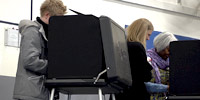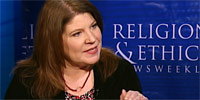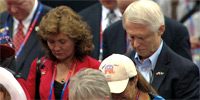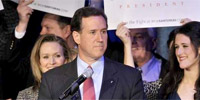In This Episode << SLIDE LEFT TO SEE ADDITIONAL SEGMENTS
2008 Campaign: Religion at the RNC
BOB ABERNETHY, anchor: Over patriotic shouts and symbols, John McCain this week officially accepted the Republican Party’s nomination for president.
Sen. MCCAIN: We’re Americans and we never give up. We never quit. We never hide from history. We make history. Thank you and God bless you, and God bless America.
ABERNETHY: McCain’s surprising choice of Governor Sarah Palin to be his running mate was overwhelmingly popular among Republican social conservatives. Kim Lawton covered the Republican Convention, and has our report.
KIM LAWTON: Kim Lehman is a Roman Catholic and an Iowa delegate to the Republican National Convention. Her opposition to abortion was one of the reasons she got involved in politics. Like many other religious conservatives, Lehman came here not feeling completely enthused about John McCain’s candidacy.
KIM LEHMAN (Iowa Delegate): It wasn’t as lukewarm as much as it was waiting to see if John McCain was going to hold to his commitment to have a pro-life administration.
LAWTON: Lehman says McCain’s selection of Sarah Palin as a running mate changed everything.
Ms. LEHMAN: It was like taking a rubber band, pulling it backward and just shooting us through excitement. And so all of us being on the reciprocating end of emails, phone calls—everybody’s excited.
Governor SARAH PALIN (during acceptance speech, Republican National Convention): We are expected to govern with integrity, good will, clear convictions, and a servant’s heart.
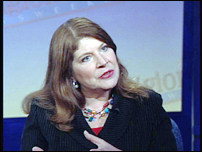 Kim Lawton |
LAWTON: The nomination of Palin, an evangelical Christian who opposes abortion, has been controversial in some quarters. But it has clearly mobilized the Republican Party’s social conservative base and given the McCain ticket a big boost of energy. Many in that base were deeply concerned in the weeks leading up to the convention when McCain’s campaign floated the idea of picking a pro-choice running mate.
Dr. RICHARD LAND (President, Southern Baptist Convention’s Ethics & Religious Liberty Commission): I told the McCain people flat out that would inflict a mortal wound on his campaign, one from which he could not have recovered. If he had picked a pro-choice candidate, he was going to lose. He still may lose. But that would have been it. He could never have recovered among evangelicals and social conservative Catholics if he had picked a pro-choice running mate.
LAWTON: Pro-family conservatives here were not fazed by the news that Palin’s unmarried 17-year-old daughter is pregnant, and as media questions about Palin’s family life intensified, so did conservative resentment.
GARY BAUER (President, American Values, speaking at Republican Convention): They have taken a 17-year-old girl and they are trying to use the crisis pregnancy that she finds herself in as a battering ram, as a club to damage her mother, her family, to damage Senator McCain. It is outrageous. It’s tabloid journalism and they ought to be ashamed of themselves.
LAWTON: Leaders here said they did not expect a widespread evangelical backlash over the fact that Palin is a working mom with small children, especially because Palin’s husband Todd shoulders much of the family responsibility.
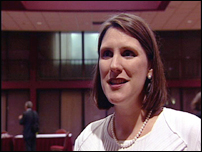 Charmaine Yoest |
CHARMAINE YOEST (Americans United for Life Action): To me it appears that they may have made a real conscious decision to move forward in a family partnership, in a mission that she’s been called to. And so I think we have to be very careful as we look at each family and the decisions they have made, particularly when they very clearly have made decisions to have the father very heavily involved in taking care of the children.
LAWTON: Evangelicals and other social conservatives have been a key part of the Republican’s winning coalition, and the GOP is depending on them again this year. But the party also has to walk a fine line. According to a new survey from the Pew Research Center, nearly half of all Americans think religious conservatives have too much control over the Republican Party. Still, Republican strategists are developing a wide-ranging effort to mobilize religious voters. Nancy Pfotenhauer is a senior policy advisor to the McCain campaign.
NANCY PFOTENHAUER (Senior Policy Advisor, McCain Campaign): They’re a crucial part of the electorate, and you know, we get a lot of energy from this part of our base. I’m a proud member of the faith community. This community knows how to impact elections, and they’ve got the networks in place that can do so, everything from going door to door to speaking to their communities to getting information out to turning out the vote.
LAWTON: Evangelicals gathered for a prayer breakfast at a local Christian club, even though the venue was far away from the main convention events. They are the single largest religious voting bloc, and they are entrenched in many levels of the Republican Party apparatus. People like Tamara Scott, a delegate from Iowa, believe they are part of a longstanding tradition of faith influencing American politics.
TAMARA SCOTT (Iowa Delegate): Once I got into politics, I was even more encouraged to find out our Founding Fathers had the same basic tenets of faith that I do, and that’s what created this great country. It was their faith that spurred them on and gave them the courage to take the brave steps that they did in signing that Declaration of Independence.
LAWTON: But the GOP has a challenge in reaching out to younger evangelicals who appear to be embracing a broader set of issues than their parents. At a local church here, 26-year-old Bjorn Amundson is an undecided evangelical who’s against abortion but describes himself as a social liberal on other issues.
 Bjorn |
BJORN: I can’t just pick Republican or Democrat. I have to know who they are. So I think that actually makes me end up voting less, but caring about more who I vote for.
JIM WALLIS (Author, “The Great Awakening”): The monologue of the religious right is over, and now it’s a new dialogue. Sarah Palin will be evaluated not just on her stance on abortion, but her stance, her record on poverty, on the environment, on the war in Iraq. So there’s a wider conversation now, and that’s a good thing for politics and certainly for the faith community.
LAWTON: The GOP is aggressively reaching out to another key constituency — Catholics. In 2004, a slight majority of Catholics voted Republican. But in the 2006 mid-term elections, a slight majority voted Democratic, and the Democrats took over Congress. Kansas Senator Sam Brownback is helping to lead McCain’s Catholic outreach.
Senator SAM BROWNBACK (R-KS, speaking at Republican National Convention): The Catholic vote is a swing vote, it is a critical vote in swing states. It is a vote we can win but only if we work to win it.
LAWTON: Republicans are also hoping for some new inroads among Jewish voters who have long been an important base for the Democrats. Now surveys show that while a majority of Jews are still supporting Barack Obama, the numbers are significantly lower than in other recent elections.
MATTHEW BROOKS (Republican Jewish Coalition, during panel discussion). I think there is real concern about statements and votes on positions he has taken with regard to issues like Iran. I think that there are very serious questions regarding his views as it relates to Israel and the peace process. I think there are very real questions about his naiveté, his lack of experience when it comes to foreign policy in a very, very dangerous time, in a very, very dangerous world where we find ourselves.
LAWTON: McCain has never appeared comfortable addressing issues of faith directly. But his campaign is stressing character and courage in its appeals across the faith community.
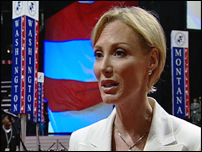 Nancy Pfotenhauer |
Ms. PFOTENHAUER: Doing the right thing when it’s easy, you know, a lot of us can fall into that category. But doing the right thing when it’s difficult is where character is shown, and you really see that in Sen. McCain’s walk in life, and I think you see that also very much in his running mate.
LAWTON: The Republicans hope that will sustain enthusiasm through November 4. I’m Kim Lawton in Minneapolis-St. Paul.
ABERNETHY: Kim, tell us more about Sarah Palin, especially Sarah Palin and religion.
LAWTON: Well, Sarah Palin was baptized as a Roman Catholic when she was an infant. When she was a teenager, her family started to go to the Assemblies of God church, and so she was rebaptized in the Assemblies of God. That, of course, is the flagship denomination of the Pentecostal movement, this very fast-growing part of Christianity that really emphasizes the Holy Spirit. She went to Assemblies of God churches until about 2002, and now she attends an independent, nondenominational Bible church.
ABERNETHY: Now Pentecostals typically believe that speaking in tongues is an important sign of holiness. Is that in her background?
LAWTON: Well, we don’t know exactly what Sarah Palin’s specific beliefs and practices are because she hasn’t talked about them a lot. We don’t know if she does speak in tongues. But certainly in the Assemblies of God that is a very common practice. Not everybody at an Assemblies of God church speaks in tongues, but that is a very common practice.
ABERNETHY: And her religious background is now being scrutinized very carefully, isn’t it?
LAWTON: Well, just like we saw with Barack Obama’s former pastor, Jeremiah Wright, Sarah Palin’s former pastors are being scrutinized. People are looking at the sermons that they’ve preached and the theology that they’ve taught. And certainly in this age of YouTube and blogging, it’s being sent all over the place and being given a real political spin, too.
ABERNETHY: You were at the Democratic Convention as well as the Republican Convention. How did they compare in their attention to religious life?
LAWTON: Well, religion was part of both conventions, but it was handled very differently. At the Democratic Convention, it was really front-and-center this time around — a big change from the past, and the Democrats were really trying to advertise, “Hey, we do like religion,” because a lot of Americans think they don’t. So all of their events were very high-profile. On the Republican side, it wasn’t so much front-and-center, but it was certainly there. Religious people were very involved, but it tended to be more on the sidelines a little bit, not in primetime. Also, in the Democratic Convention you saw all these faith groups coming together — diversity gathered. In the Republican Convention, it was a little more narrowcast, so you had Roman Catholics meeting together, evangelicals meeting together — separately. But they both really paid attention to religion.
ABERNETHY: Kim Lawton, many thanks.


